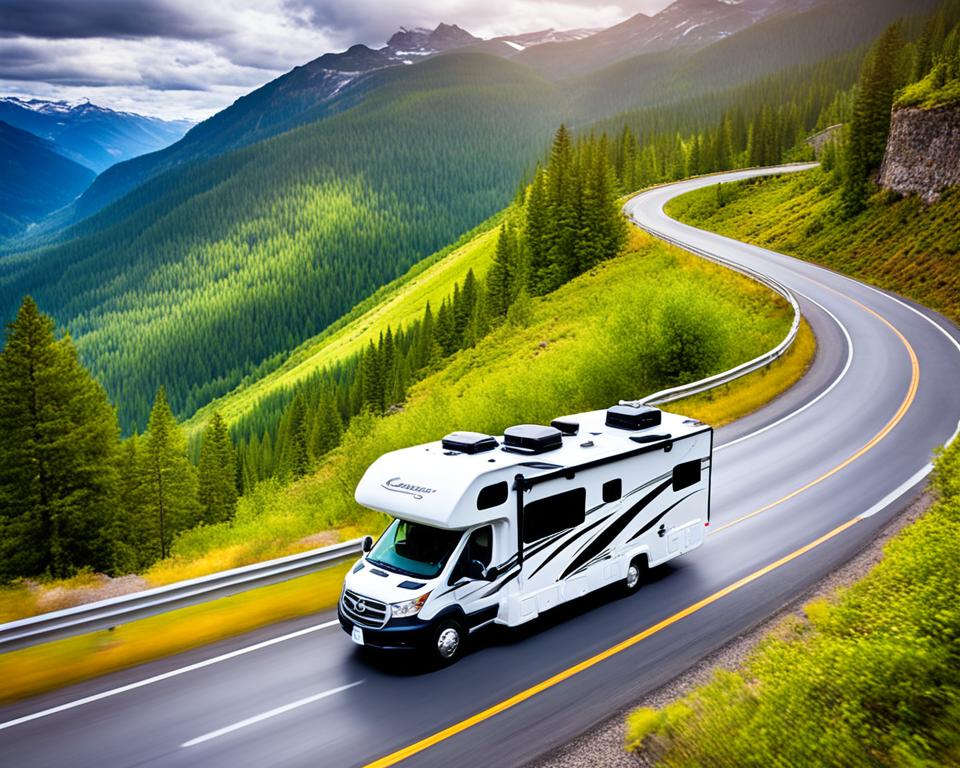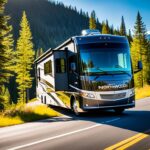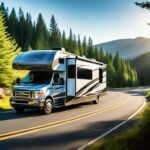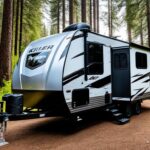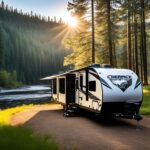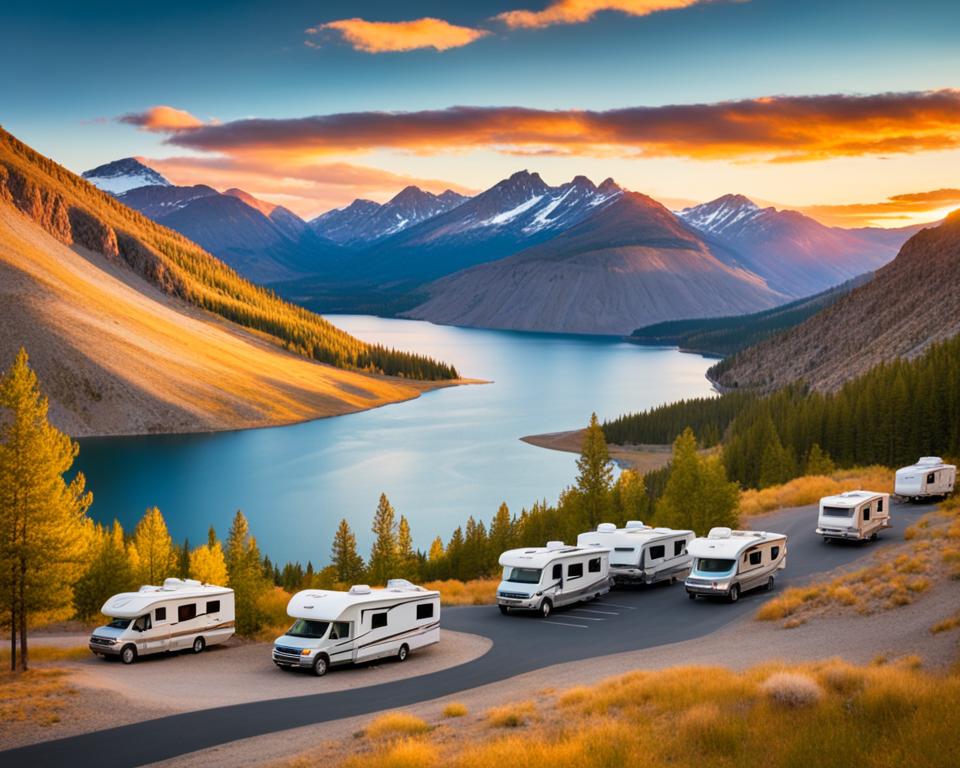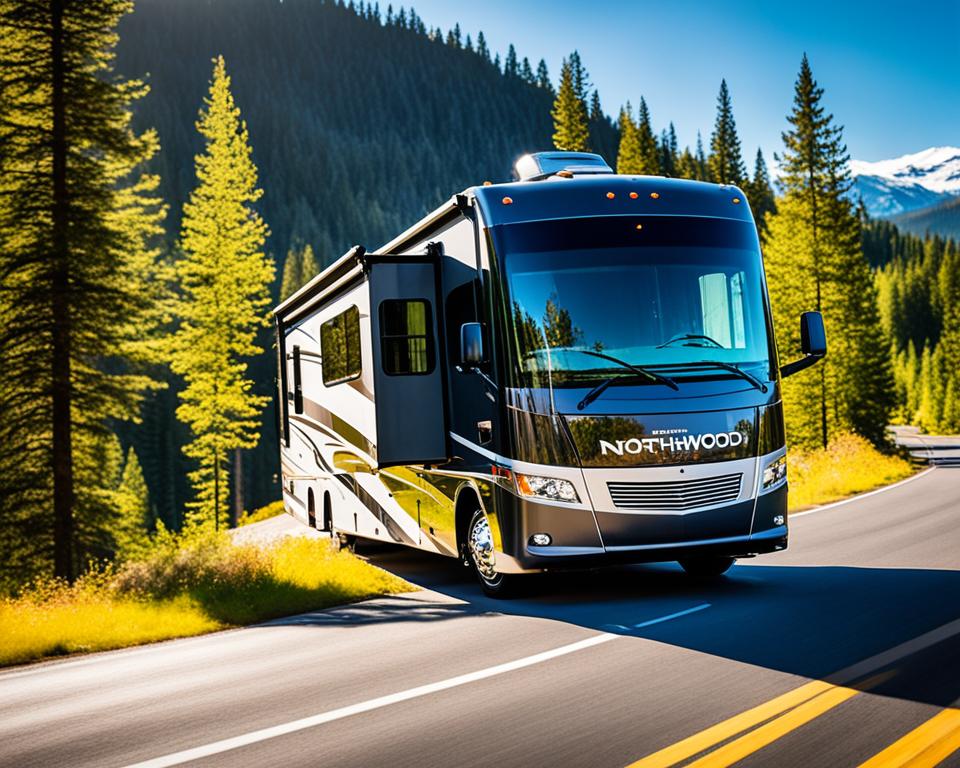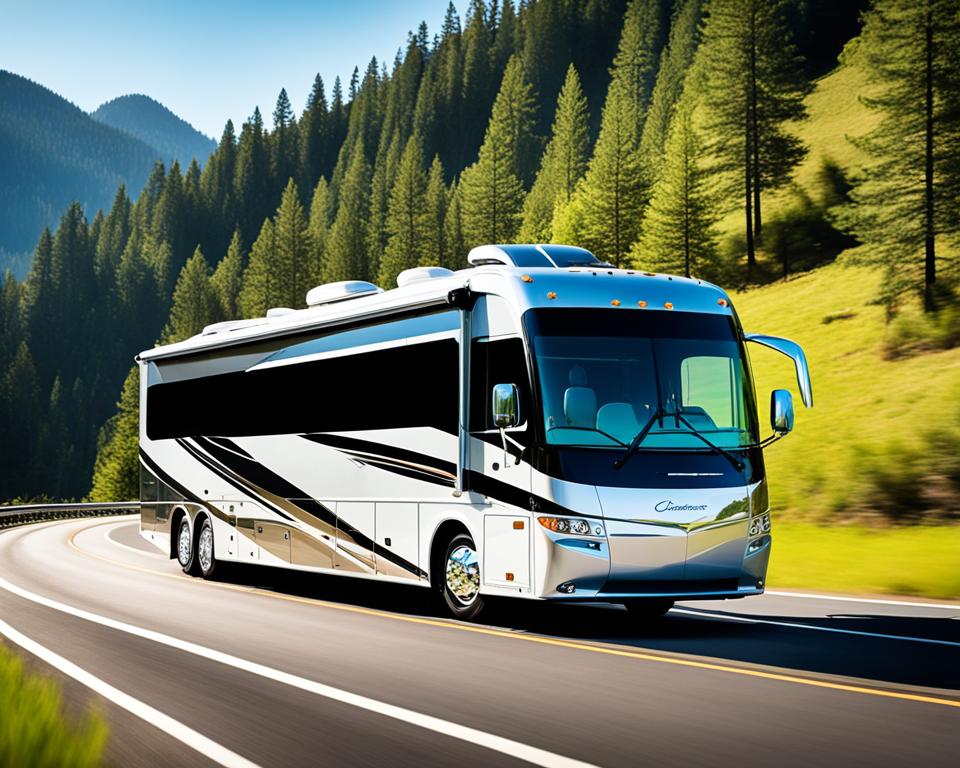Class C motorhomes are a popular choice for RV enthusiasts looking for a balance of amenities and affordability. They offer more space than a camper van but are easier to maneuver than a Class A motorhome. These mid-size motorhomes are typically built on Ford chassis and feature decent towing capacities. While they have less interior space than Class A motorhomes, Class C motorhomes excel in providing more amenities and comfort for extended trips.
Key Takeaways:
- Class C motorhomes are a versatile option for RV enthusiasts seeking space and mobility.
- They offer more amenities and comfort compared to camper vans and are easier to maneuver than Class A motorhomes.
- Class C motorhomes are typically built on Ford chassis and have decent towing capacities.
- A top consideration when purchasing a Class C motorhome is fuel efficiency, engine type, and sleeping capacity.
- Some popular brands in the Class C RV category include Winnebago, Jayco, Thor Motor Coach, and Coachmen.
When purchasing a Class C motorhome, it’s important to ask about fuel efficiency, engine type, lifespan of tires, sleeping capacity, warranty service package, propane tank size, and walk-through of features and amenities. Some top brands in the Class C RV category include Winnebago, Jayco, Thor Motor Coach, and Coachmen.
Advantages of Class C Motorhomes
Class C motorhomes offer several advantages compared to other RV types. Their compact size and maneuverability make them easy to navigate through tight spaces and winding roads. They can fit into a wide range of parks and campsites and often have better gas mileage than Class A motorhomes. Class C motorhomes feature a front-end engine, similar to a truck or SUV, making it easily accessible. They also offer more sleeping and storage space compared to Class B campers. While Class B campers may be more fuel-efficient and maneuverable, Class C motorhomes provide more amenities and comfort for extended trips.
One of the key advantages of Class C motorhomes is their compact size and maneuverability. Unlike the larger, bus-like Class A motorhomes, Class C motorhomes are built on a truck chassis, making them easier to navigate through tight spaces and winding roads. This makes them an ideal choice for those who want the convenience of an RV without the challenges of maneuvering a large vehicle.
Another advantage of Class C motorhomes is their versatility when it comes to parking and camping. Their smaller size allows them to fit into a wide range of parks and campsites that may not accommodate larger RVs. Whether you prefer staying at a scenic campground or a cozy state park, you’ll have more options with a Class C motorhome.
In addition, Class C motorhomes often have better gas mileage compared to their Class A counterparts. This can translate to significant cost savings in the long run, especially for those who enjoy frequent RV trips. The front-end engine design also means that the engine is easily accessible for maintenance and repairs, similar to a truck or SUV.
Class C motorhomes also offer more sleeping and storage space compared to Class B campers. With features such as an over-cab bunk space and convertible dining tables, Class C motorhomes can comfortably accommodate more people during your road trips. This makes them a great choice for families or those who enjoy traveling with friends.
While Class B campers may be more fuel-efficient and maneuverable, Class C motorhomes provide a balance of amenities, comfort, and space for extended trips. With features such as a kitchen, bathroom, and sleeping quarters, Class C motorhomes offer everything you need for a comfortable and enjoyable journey.
Class C RVs for Sale: Top Picks
When it comes to full-time RV living, Class C motorhomes are a popular choice for their comfort and maneuverability. These mid-size motorhomes offer a balance of space and amenities, making them ideal for long-term travel. If you’re in the market for a Class C RV, check out these top picks:
-
Winnebago Minnie Winnie
The Winnebago Minnie Winnie is a versatile Class C RV that combines quality craftsmanship with innovative design. With multiple floorplans to choose from, it offers ample sleeping and living space for full-time RVers. Whether you’re seeking adventure or relaxation, the Minnie Winnie provides comfort and convenience on the road. Price range: $75,000 – $100,000.
-
Jayco Greyhawk
The Jayco Greyhawk is known for its durability and luxury features. Equipped with a spacious interior, state-of-the-art technology, and high-quality finishes, this Class C motorhome offers a premium RVing experience. Whether you’re traveling solo or with a family, the Greyhawk provides the perfect blend of comfort and style. Price range: $90,000 – $130,000.
-
Thor Motor Coach Chateau
The Thor Motor Coach Chateau offers a range of floorplans and features to accommodate various travel needs. Known for its durability and value, this Class C RV provides a comfortable and reliable home on wheels. With spacious interiors, modern amenities, and stylish designs, the Chateau is a top choice for full-time RV living. Price range: $80,000 – $120,000.
-
Coachmen Freelander
The Coachmen Freelander combines affordability and quality to create an exceptional RVing experience. With its wide range of floorplans and configurations, it caters to the needs of different travelers. The Freelander offers spacious interiors, practical features, and reliable performance, making it an excellent choice for full-time adventurers. Price range: $65,000 – $90,000.
These Class C RVs for sale provide a combination of comfort, functionality, and affordability, making them top picks for full-time RV living. Consider your specific needs and budget when choosing the right Class C motorhome for your next adventure.
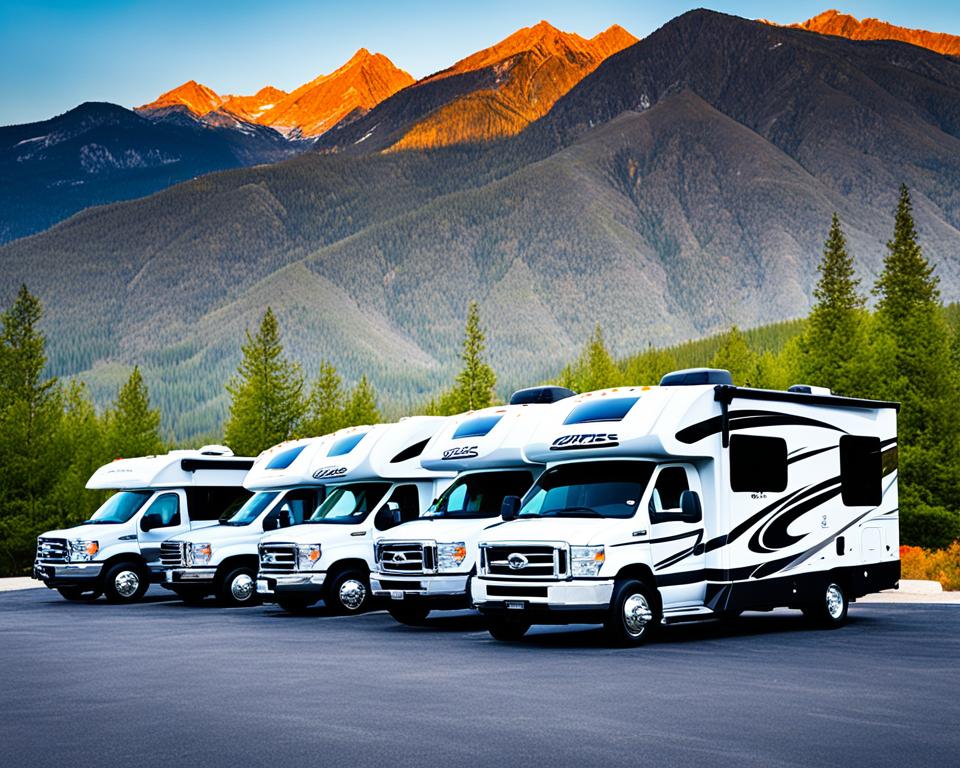
Considerations When Choosing a Class C Motorhome
When choosing a Class C motorhome, there are several important factors to consider. These include:
- Power source: One of the main considerations is whether to choose a diesel or gas-powered motorhome. Gas-powered motorhomes are generally less expensive at the time of purchase, while diesel motorhomes offer better fuel efficiency, making them more cost-effective in the long run.
- Size: Class C motorhomes come in various lengths, ranging from 21 to 41 feet. Longer models, often referred to as Super C motorhomes, provide additional space and amenities. Consider your specific needs for living space, storage, and maneuverability when choosing the size of your motorhome.
- Layout: The layout of the motorhome is another crucial factor to consider. Different floor plans cater to families, couples, or full-time RVers. Take into account the number of sleeping areas, seating options, kitchen setup, and overall comfort when evaluating the layout options.
- Brand preferences: Research different brands and read reviews to determine which manufacturers have a strong reputation for quality and reliability. Some popular Class C motorhome brands include Winnebago, Jayco, Thor Motor Coach, and Coachmen.
- New or used: Decide whether you prefer to buy a new or used motorhome. While a new motorhome offers the latest features and warranties, a used motorhome may provide better value for your budget. Consider factors such as mileage, condition, and maintenance history when evaluating used options.
Fuel Efficiency Comparison
When comparing diesel and gas-powered Class C motorhomes, it is essential to understand their fuel efficiency:
| Diesel Motorhome | Gas Motorhome | |
|---|---|---|
| Fuel Efficiency | 15-18 MPG | 8-12 MPG |
| Pros | Higher fuel efficiency, more torque for towing | Lower upfront cost, convenient fuel availability |
| Cons | Higher initial cost, fewer service locations for diesel engines | Lower fuel efficiency, reduced towing capacity |
Choosing between a diesel and gas-powered Class C motorhome ultimately depends on your travel preferences, budget, and priorities. If fuel efficiency and towing capacity are your primary concerns, a diesel motorhome may be the better choice. On the other hand, if upfront cost and availability of fuel are more important to you, a gas motorhome may be the more suitable option.
Remember to conduct thorough research, visit dealerships for test drives, and consult with RV experts to ensure that your Class C motorhome meets all your requirements. By carefully considering these factors, you can make an informed decision and find the perfect Class C motorhome for your adventures.
Parking Options for Class C Motorhomes
Class C motorhomes offer a range of parking options due to their manageable size. Whether you’re planning a scenic camping trip or a quick rest stop, there are plenty of places where you can park your Class C motorhome.
National and State Park Campgrounds
If you’re looking to immerse yourself in the beauty of nature, national and state park campgrounds are an excellent choice. These campgrounds often provide designated spots for RVs, including Class C motorhomes. You can enjoy stunning landscapes, hiking trails, and a peaceful camping experience surrounded by nature.
RV Resorts
If you prefer a more luxurious camping experience with amenities such as pools, hot tubs, and organized activities, RV resorts are the perfect option. These resorts cater specifically to RV enthusiasts and provide spacious sites for Class C motorhomes. You can relax and enjoy the resort’s facilities while being surrounded by fellow RVers.
National Forests
If you’re seeking a more secluded and rustic camping experience, national forests offer ample opportunities for Class C motorhome parking. These beautiful natural areas provide a sense of tranquility and allow you to reconnect with nature. However, ensure that you research the specific forest’s regulations regarding RV camping and parking.
Bureau of Land Management (BLM) Land
BLM land offers vast stretches of public land where you can camp and park your Class C motorhome. These areas are generally less crowded and provide a unique sense of freedom and exploration. However, make sure to check the regulations and permits required for overnight stays on BLM land.
Rest Stops and Select Public Parking Lots
For quick stops during road trips, rest stops and select public parking lots can be convenient options for Class C motorhome parking. These locations often provide dedicated spaces for RVs, allowing you to take a break, rest, or grab a bite to eat before continuing your journey.
Military Bases
Military bases may offer parking options for veterans or Department of Defense employees who own Class C motorhomes. If you’re eligible, it can be a convenient and secure option, especially if you have access to base facilities and amenities.
Explore Your Options
When planning your RV trips, take the time to research the parking options available at your desired destinations. Websites, travel apps, and RV forums can provide valuable information and recommendations. It’s always beneficial to have a plan in place to ensure a smooth and enjoyable experience when parking your Class C motorhome.
Parking your Class C motorhome doesn’t have to be a daunting task. With the right knowledge and information, you can find the perfect spot to park and begin your adventures. Whether you opt for campgrounds, resorts, forests, or public parking lots, there are plenty of options for Class C motorhome owners to explore.
Pricing and Costs of Class C Motorhomes
When it comes to purchasing a Class C motorhome, one of the critical factors to consider is the cost. The price of Class C motorhomes can vary significantly, depending on various factors such as size, amenities, brand, and whether it’s new or used.
For those looking for a smaller Class C motorhome with basic amenities, prices can start around $50,000. These entry-level options provide the essentials for comfortable traveling and RVing adventures. On the other hand, if you’re seeking a more luxurious and spacious option, larger Super Class C RVs with premium features can exceed $200,000. These high-end models offer top-tier amenities and ample space for a luxurious RV lifestyle.
However, it’s important to note that the initial purchase price is not the only expense you’ll incur when owning a Class C motorhome. There are additional costs to consider to get a comprehensive picture of the expenses involved. Some common expenses to budget for include:
- Sales tax: Depending on your local tax laws, you may need to pay sales tax when purchasing a Class C motorhome. The tax rate can vary, so it’s essential to factor it into your budget.
- Insurance: Protecting your investment with insurance coverage is crucial. The cost of insurance can vary based on factors such as your driving history, location, and coverage needs.
- Dealer fees: When purchasing a new or used Class C motorhome, there may be additional fees charged by the dealership. These fees can include documentation fees, delivery fees, and processing fees.
- Registration fees: Just like registering a car, you’ll need to register your Class C motorhome with the appropriate DMV or motor vehicle division. Registration fees can vary depending on your location and the size of the motorhome.
When determining the cost of a Class C motorhome, it’s essential to consider both the initial purchase price and the ongoing expenses. Analyze your budget, desired features, and future travel plans to make an informed decision within your means.
| Expense | Approximate Cost |
|---|---|
| Sales Tax | Varies based on local tax laws |
| Insurance | Varies based on factors such as driving history and coverage needs |
| Dealer Fees | Additional fees charged by the dealership |
| Registration Fees | Varies based on location and motorhome size |
Upgrades for Class C Motorhomes
Personalizing and upgrading your Class C motorhome can enhance your RVing experience. Some common upgrades include interior layout modifications, exterior enhancements, and decorative changes. One essential upgrade recommended for all Class C motorhome owners is replacing the door handle with an RVLock. RVLock offers keyless entry locks specifically designed for Class C motorhomes, providing maximum security and peace of mind. Upgrading your locks with RVLock ensures the safety of yourself and your belongings during your travels.
Enhancing your Class C motorhome with upgrades allows you to customize your living space to fit your unique needs and preferences. Interior layout modifications can include rearranging furniture, installing additional storage compartments, or upgrading appliances. These modifications help create a comfortable and functional living area, making your motorhome feel like a home away from home.
Exterior enhancements can involve adding features such as awnings, bike racks, rooftop solar panels, or leveling systems. These upgrades increase the convenience and versatility of your motorhome, allowing you to enjoy outdoor activities and harness solar power for off-grid adventures. You can also consider decorative changes, such as updating the flooring, upholstery, or window treatments, to give your motorhome a fresh and modern look.
Replacing the door handle with an RVLock is a crucial safety upgrade for any Class C motorhome. The RVLock keyless entry system provides convenience and peace of mind by eliminating the need for traditional keys. With an RVLock, you can easily lock and unlock your door using a keypad or a remote, ensuring that your motorhome is secure at all times.
Additionally, the RVLock keyless entry system offers features like key fob compatibility, built-in keypads with backlit buttons for easy navigation during nighttime, and compatibility with multiple entry doors. With these features, you can enhance the security and functionality of your motorhome, providing a stress-free and enjoyable RVing experience.
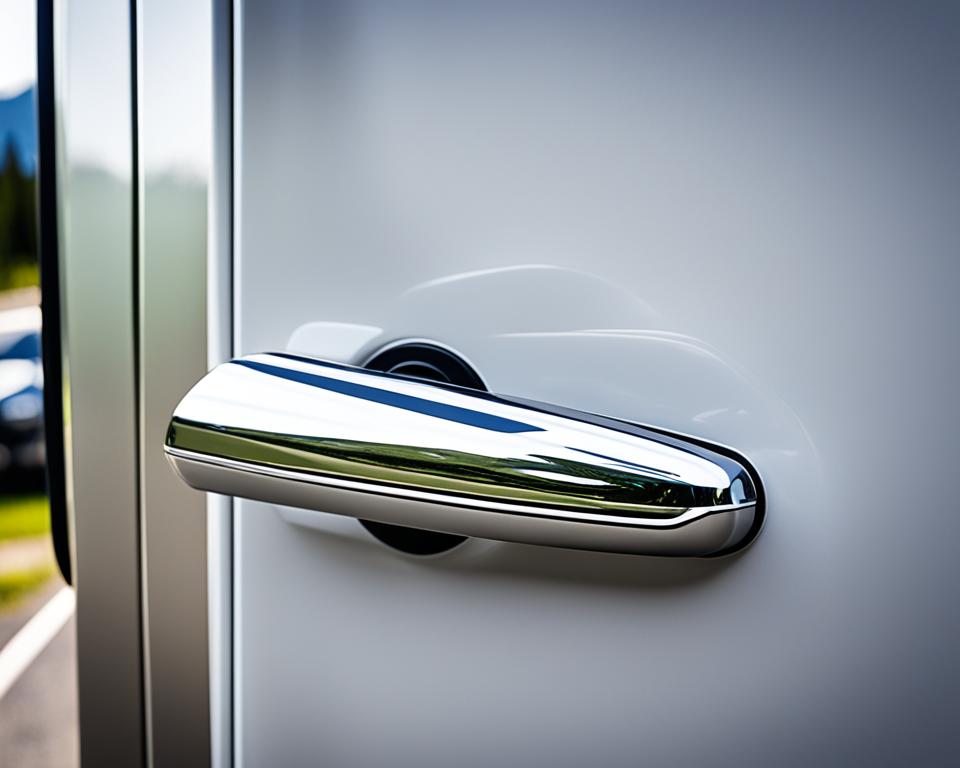
Upgrade your Class C motorhome with a secure and convenient RVLock keyless entry system to take your RVing adventures to the next level. With the ability to personalize and enhance your motorhome’s interior, exterior, and safety features, you can create a truly customized and optimized RVing experience.
Sleeping Accommodations in Class C Motorhomes
Class C motorhomes offer comfortable sleeping accommodations that can accommodate four to eight people, depending on the floor plan and length of the RV. These sleeping arrangements ensure restful nights during your adventures.
Most Class C motorhomes feature the following sleeping options:
- Queen-size bed: A spacious queen-size bed is typically available for two adults.
- Convertible dining table: A dining table that can be converted into a bed provides sleeping space for two children or one adult.
- Over-cab bunk: An over-cab bunk space is designed to accommodate two additional adults.
Larger Super C RVs may even provide sleeping options for up to ten people, making them suitable for larger families or groups of friends.
Here is an example of the sleeping accommodations in a Class C motorhome:
| Sleeping Area | Bed Size | Capacity |
|---|---|---|
| Master Bedroom | Queen | 2 Adults |
| Convertible Dining Table | Full | 2 Children or 1 Adult |
| Over-cab Bunk | Twin | 2 Adults |
The flexibility of these sleeping arrangements allows for a comfortable and restful experience for everyone onboard the Class C motorhome.
Towing Capabilities of Class C Motorhomes
When it comes to Class C motorhomes, towing capabilities are an important consideration for RV owners. Whether you want to bring along a small car or vehicle for exploration at your destination, understanding the towing capacity of your motorhome is crucial. Let’s take a closer look at the towing capabilities of Class C motorhomes.
Class C motorhomes are designed to have towing capabilities, allowing you to bring along a secondary vehicle or trailer. The towing capacity of Class C motorhomes typically falls within the range of 3,000 to 8,000 pounds, depending on the specific model and manufacturer.
To determine if your Class C motorhome is capable of towing a vehicle, you need to consider certain factors. The first is the Gross Vehicle Weight Rating, or GVWR, which is the maximum weight that your motorhome can safely carry, including passengers, fuel, and cargo. The Gross Combined Weight Rating, or GCWR, is the maximum weight of both your motorhome and any towed vehicle or trailer combined.
When determining if your specific Class C motorhome can tow a vehicle, it’s crucial to ensure that the weight of the car or vehicle you plan to tow falls within these towing capacity limits. Exceeding these limits can put unnecessary strain on your motorhome’s engine and can compromise your safety on the road.
It’s also important to consider whether your specific car is suitable for flat towing or if it requires an alternative method such as using a dolly. Flat towing, also known as dinghy towing, is a method used to tow a car behind a motorhome without a trailer. Not all cars are suitable for flat towing, so it’s essential to consult your car’s manual or the manufacturer for accurate information.
Consulting the Manual for Accurate Towing Information
When it comes to determining the towing capabilities of your Class C motorhome, it’s always best to consult the relevant manuals and documentation provided by your motorhome manufacturer. These resources will outline the towing capacities, safety guidelines, and any specific requirements or recommendations for towing a vehicle behind your motorhome.
“Consult the motorhome and vehicle manuals or the manufacturer for accurate towing information and guidelines.”
Towing a vehicle behind your Class C motorhome can add a new level of convenience and flexibility to your RVing adventures. However, it’s crucial to ensure that your motorhome is equipped with the necessary towing capabilities and that you follow all safety guidelines and recommendations for a safe and enjoyable towing experience.
| Towing Capacity | Weight Range |
|---|---|
| Minimum | 3,000 pounds |
| Maximum | 8,000 pounds |
Conclusion
Class C motorhomes offer a versatile and affordable option for RV enthusiasts seeking a balance of space, mobility, and amenities. These mid-size motorhomes provide more comfort and amenities than a camper van while remaining easy to maneuver compared to Class A motorhomes. Whether you prioritize maneuverability, family-friendly features, or luxury, Class C motorhomes offer a range of options to suit your lifestyle.
When embarking on your Class C motorhome journey, it is important to conduct thorough research and ask important questions. Consider factors such as fuel efficiency, engine type, sleeping capacity, and warranty service package. Visit dealerships for test drives to ensure that your chosen motorhome meets all your requirements.
With the right Class C motorhome, you can embark on epic adventures and create lasting memories on the open road. Whether you’re exploring national parks, camping at scenic campgrounds, or simply enjoying the freedom of the RV lifestyle, Class C motorhomes provide the perfect blend of convenience and comfort. Start your Class C motorhome journey today and experience the joy of traveling and living on your terms.
FAQ
What are the advantages of a Class C motorhome?
Class C motorhomes offer a balance of amenities and affordability, more sleeping and storage space compared to Class B campers, and easier maneuverability than Class A motorhomes.
What are some top picks for Class C RVs for sale?
Some top brands in the Class C RV category include Winnebago, Jayco, Thor Motor Coach, and Coachmen.
What should I consider when choosing a Class C motorhome?
Consider factors such as fuel efficiency, engine type, tire lifespan, sleeping capacity, warranty service package, propane tank size, and features and amenities during your decision-making process.
Where can I park my Class C motorhome?
Class C motorhomes can fit into a wide range of parks and campsites, including national and state park campgrounds, RV resorts, national forests, Bureau of Land Management (BLM) land, rest stops, and select public parking lots.
How much do Class C motorhomes cost?
The cost of Class C motorhomes can vary depending on factors such as size, amenities, brand, and whether it’s new or used. Smaller Class Cs with basic amenities can start around $50,000, while larger Super Class C RVs with luxury features can exceed $200,000.
What are some upgrades I can make to my Class C motorhome?
Some common upgrades include interior layout modifications, exterior enhancements, and replacing the door handle with an RVLock for improved security and peace of mind.
How many people can sleep in a Class C motorhome?
Class C motorhomes typically offer comfortable sleeping accommodations for four to eight people, depending on the floor plan and length of the RV.
Can a Class C motorhome tow a vehicle?
Yes, Class C motorhomes typically have towing capabilities for a small car or vehicle, with towing capacities ranging from 3,000 to 8,000 pounds. It’s important to ensure the weight of the vehicle falls within this towing capacity.
What is the cost of a Class C motorhome?
The cost of a Class C motorhome can vary depending on factors such as size, amenities, brand, and whether it’s new or used.
How do I choose the right Class C motorhome for me?
When choosing a Class C motorhome, consider factors such as fuel efficiency, engine type, tire lifespan, sleeping capacity, warranty service package, propane tank size, and features and amenities that align with your needs and preferences.

